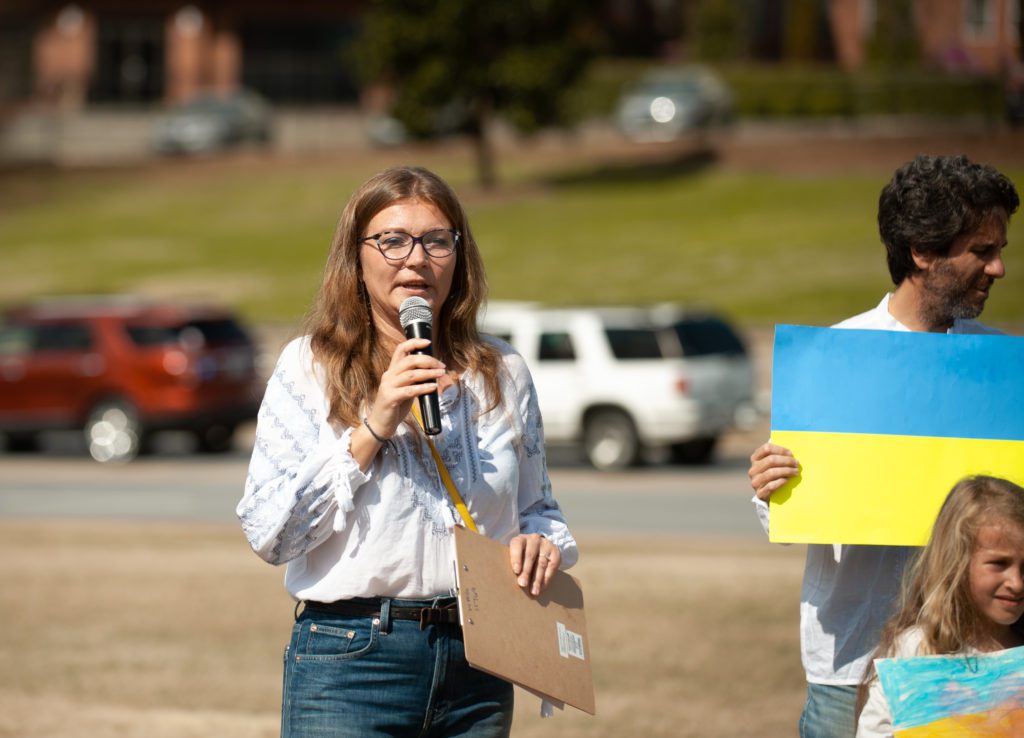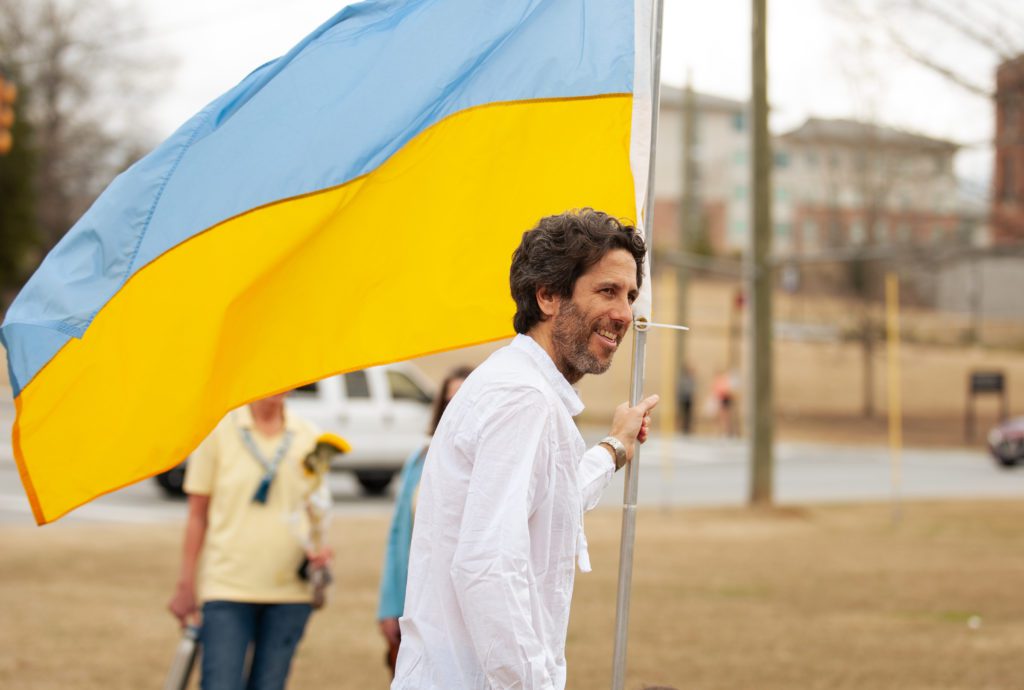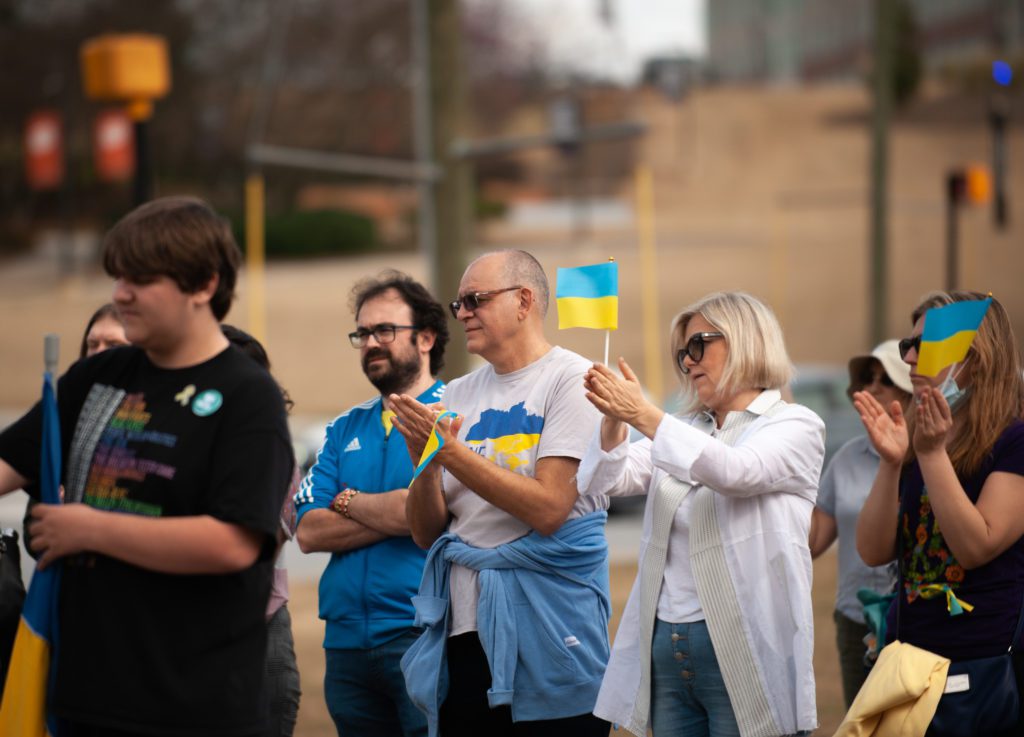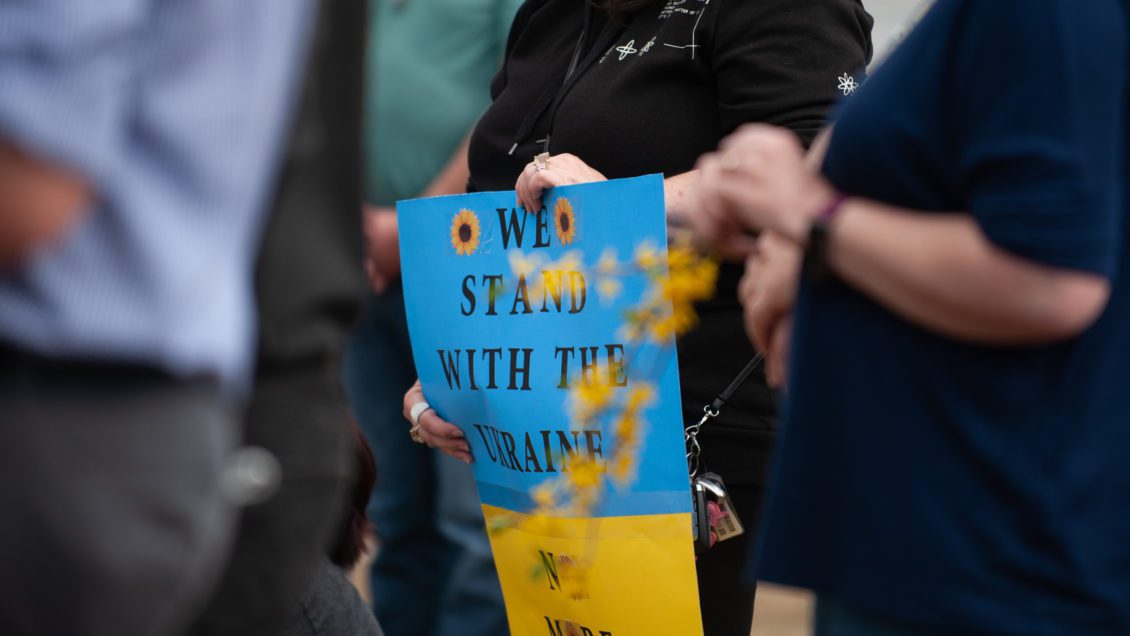With every headline and each phone call, those with ties to Ukraine and surrounding countries are struggling. And yet, the teaching and learning and discovery is still happening at Clemson. Alongside it, deeper understandings are also being formed of the humanitarian crisis abroad.
Selfies have taken on new meaning for physics and astronomy professor Marco Ajello and Lyudmyla Tsykalova, his Ukrainian-born wife who is also a recent Ph.D. graduate from Clemson’s international family and community studies program. The couple met in Italy two decades ago in Ajello’s hometown of Palermo, Sicily, where Tsykalova moved shortly after she graduated from college. They relocated to South Carolina in 2014 and are raising two children here. Friends and family remain scattered across Europe, and all of Tsykalova’s childhood memories are of a place now under siege and increasingly unrecognizable.
As war rages and the humanitarian crisis grows in Ukraine, life is complicated for families like Ajello and Tsykalova’s — and so many others throughout the University community. Schoolmates, childhood friends, and, most intimately, Tsykalova’s father, who lives in Kyiv, are among those they worry and wonder about day and night.
And then a cellphone flickers to life.
In the balance
“I am spending my life right now on the phone with Poland at all times,” says Aga Skrodzka, an associate professor of film studies who spearheaded Clemson’s world cinema program. She is a dual citizen of Poland and the U.S., and her family — including her mother, siblings, plus countless friends and childhood neighbors — remains there. Her mother lives at the edge of Poland near Belarus and Ukraine.
“We are on the border of humanitarian disaster,” she says. “Food shortages, a food supply chain that is very fragile right now, medical care that is nonexistent. Hospitals have either closed or moved into basements.
“I’m very closely watching the news. That is my daily life.”
She says she is increasingly aware that her Polish family is mobilized “ethically and morally” to defend their country if the war spills over into Poland. Her brother in Warsaw just had a baby but is prepared to join the defense effort; her sister, a pediatric anesthesiologist at a hospital also in Warsaw, is treating Ukrainian children who have arrived as refugees.
“There are these wonderful acts of kindness that we are observing,” she says.
There are acts of kindness here in Clemson, too, she offers. She has a colleague in Strode Tower who checks in with her regularly. Students reach out and ask questions, and they are becoming increasingly informed participants in global politics, she says. Two doctoral students recently organized a special colloquium on the war in Ukraine.


And this past weekend, a rally organized on Bowman Field brought together University and surrounding community members. Young and old. U.S. and Ukrainian flags. Children clutching construction paper paintings of blue and yellow hearts. And many who held signs with handwritten messages: “Stand with Ukraine” and “Defend Democracy.”
“I think they understand that it’s not completely like watching someone else’s war,” Skrodzka says of the local community. “As I communicate with my American friends and family and colleagues, I say, ‘I am for ending this war as soon as possible. I am protesting against the violence against civilians. I am in solidarity with those who are suffering.’ They are, as well.”
Organized for a cause
The Clemson Stands with Ukraine rally was held on Bowman Field on the afternoon of Sunday, March 6, 2022. Organized by husband-wife team Ajello and Tsykalova, about 150 gathered to hear from several speakers, wave flags and show solidarity for the Ukrainian people.
Holding a microphone amplified by a single speaker, Tsykalova shared the story of her father, who had left his home in the capital city of Kyiv 60 hours prior. There had been many days of phone calls from deep within his apartment building, sirens wailing and explosions rumbling in the background, Tsykalova recounted. Every conversation ended with “I love you,” she told the audience, not knowing if it would be the last time that they would ever speak.
“There is no more comforting place than your home, especially when something so horrible is happening outside,” she said. “But when a line of tanks is threatening you, if you don’t try to get away, it is a suicide.”
Just hours before the Clemson rally, Tsykalova said she learned that her father had, after days in transit, safely crossed the border into European Union territory. The gathered crowd applauded; several wiped away tears.
“There is a war happening. … It is Russia against the rest of the world, and Ukraine is protecting the rest of the world,” Tsykalova explained. Her 6-year-old daughter took the microphone a short while later and said, simply, “Stop the war.”

The opportunity to share these stories and encourage engagement creates a sense of community that feels significant, Ajello says, and that network of support expands as awareness grows. For every family that makes it safely across the border, like his father-in-law, there are many who do not. And still, many others deliver their children and family only to turn back to rejoin the Ukrainian defense effort.
These stories, says Ajello, are the most heartbreaking. And often his family learns of them via cellphone when a photo arrives via text message. “They’ll post a selfie to show that they are OK,” he explains.
“They are in a part of Ukraine where there is no water, no electricity, no gas, so that’s something that has scared us — how would we be contacted?” The photo, quickly snapped and sent without words, is a simple way to communicate safety. The smiling images take on a life of their own.
Learning to cope
Senior lecturer Olga Volkova teaches Russian literature, film and contemporary culture in Clemson’s College of Architecture, Arts and Humanities and the Honors College. As a dual Russian-American citizen, the violence and destruction in Ukraine weigh heavily on her daily. She is of Ukrainian descent; her mother’s family emigrated to the Far East from Ukraine, and the town actually has a Ukrainian name. She grew up nearby that town, and her parents still live near the border of China.
Her personal ties to Russia and Ukraine are strong. But her academic career is also inextricably linked to what’s happening in Central Europe, today. For six years, she has taught contemporary Russian culture and led her students in studies of Putin through her Clemson program. The present-day crisis foretells deep rifts between Russians and Ukrainians, she says, and dramatic losses — not only of lives and property — but of culture, as well.
“These are real tragedies that we cannot measure,” she says.
I feel like what we can do now is just think. If we can’t do anything directly, we at least need to be curious. We at least need to be informed. We at least need to be able to read between the lines.
Olga Volkova, Senior Lecturer of Russian
The teaching community has been a lifeline in combatting her despair about the future of Ukraine, of Russia and for all those civilizations likely to be impacted by the violence and destruction being wrought. When Putin delivered his address on the first day of the aggression, Volkova was deeply distraught. But she took that speech to her Russian literature class, and they interpreted it, analyzing Putin’s rhetoric and discussing what they learned and understood.
There is activism in the understanding, she explains: “I feel like what we can do now is just think. If we can’t do anything directly, we at least need to be curious. We at least need to be informed. We at least need to be able to read between the lines.”
Another course she teaches on Leo Tolstoy’s novel “War and Peace” has invited dialogue about Ukraine’s initial fight for independence, as well as the history of Russia and Ukraine and the complex identities of Russians regarding political memory and aggression.
“The students have been really kind and understanding of my pain, and I’ve been open and honest that I am in pain, and it hurts me as a Russian even though I am an America citizen,” she says. “I think it’s curious for them to see global history affect an individual who is close to them. Who is a part of their academic life.”
Volkova and Skrodzka both have Tuesday-Thursday classes, and there have been days following sleepless nights when they connect in Strode Tower, and the question is asked, “How am I supposed to teach?”
The teaching, it turns out, has been part of what’s pulled them through some of the most difficult days.
Skrodzka says she doesn’t speak Ukrainian, but she understands it. And likewise, she explains, she also understands what is at stake for the Ukrainian people when food is scarce, medical care is absent and the atrocities of war are on their front doorsteps.
She also feels for her Russian neighbors and friends. And she is terrified for the people she loves back home in Poland.
“As with every war, it is very complicated,” Skrodzka says.
“What is not complicated is protesting the bombing of civilians. You don’t need to have a degree in political science to decide to be in solidarity with the Ukrainian people who are fleeing for their lives.”
For more information about future events designed to support Ukraine and the humanitarian crisis abroad, organizers have created a Clemson 4 Ukraine Facebook group. Local events and opportunities to get involved are updated regularly.

